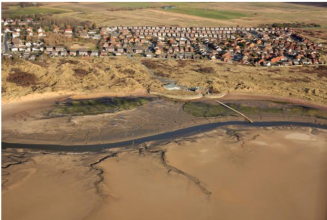Case study:Hightown Sand Dune Restoration
This case study is pending approval by a RiverWiki administrator.
Project overview
| Status | In progress |
|---|---|
| Project web site | http://www.therrc.co.uk/sites/default/files/projects/59_hightown.pdf |
| Themes | Flood risk management, Habitat and biodiversity, Monitoring, Social benefits |
| Country | England |
| Main contact forename | Graham |
| Main contact surname | Lymbery |
| Main contact user ID | |
| Contact organisation | Sefton Metropolitan Borough Council |
| Contact organisation web site | http://www.sefton.gov.uk/ |
| Partner organisations | |
| Parent multi-site project | |
| This is a parent project encompassing the following projects |
No |
Project summary
The sand dunes at Hightown north of Liverpool (Photo 1 and Map 1) were eroding at a rate of 0.5–1m per year. The structure protecting Blundellsands Sailing Club had less than a 10 year life span remaining, and 125 properties and the sailing club were at risk from coastal erosion. Using Section 106 money, a scheme was developed to buy more time by reinstating the dunes to the position they were in 30 years ago.
Prior to the project this section of coast was losing, on average, 1,000m3 of sand a year. Post project it is losing the same amount, so by moving 28,000m3 of sand 28 years of time has been bought back.
Monitoring surveys and results
Lessons learnt
Image gallery
|
Catchment and subcatchment
Site
Project background
Cost for project phases
Reasons for river restoration
Measures
MonitoringHydromorphological quality elements
Biological quality elements
Physico-chemical quality elements
Any other monitoring, e.g. social, economic
Monitoring documents
Additional documents and videos
Additional links and references
Supplementary InformationEdit Supplementary Information
| ||||||||||||||||||||||||||||||||||||||||||||||||||||||||||||||||||||||||||||||||||||||||||||||||||||||||||||||||||||||||||||||||||||||||||||||||||||||||||||||||||||||||||||||||||

